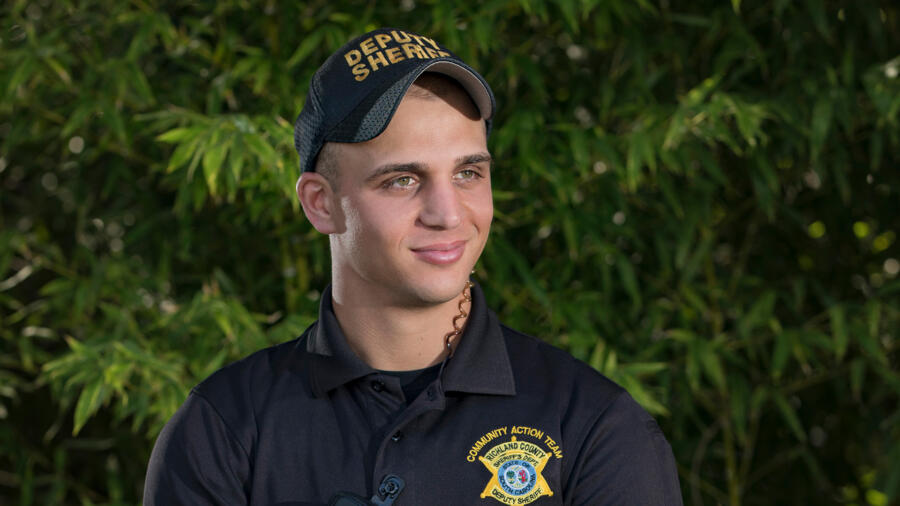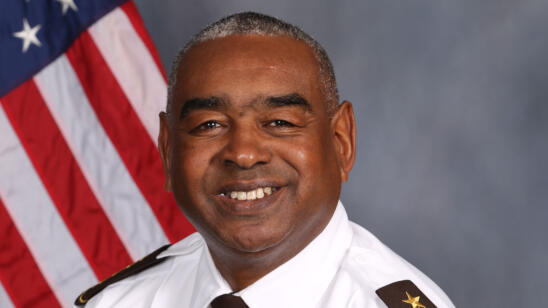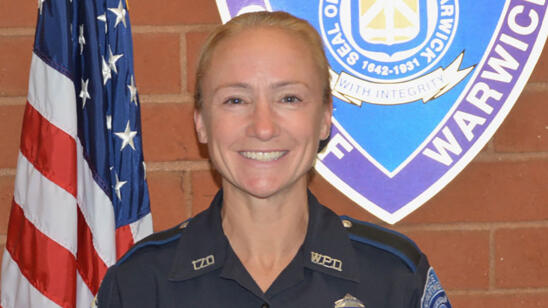If you’re a fan of Live PD, you’ll likely remember the moment in 2017 when a high-speed chase ended with a suspect flipping his car—with his young daughter inside—and being wrestled to the ground, child in hand, by a young deputy, Chris Mastrianni.
Thankfully, the five-year veteran of the Richland County (South Carolina) Sheriff’s Department had a background as a wrestling coach, and his takedown skills proved invaluable that night.
Just in time for the 100th episode of the show, Mastrianni, who is married with a baby on the way, spoke with A&E True Crime about misconceptions about policing, protocols for dangerous situations with suspects and the need for more transparency.
Why did you become a cop?
I’ve always liked helping people. I used to coach football and wrestling and other sports with younger kids. I’ve always liked giving back, and as I got older, I wanted to give back to the community where I grew up.
I had some family members who were in law enforcement. And a very good friend of my family was a cop in the town next to mine. I was always interested in cops and loved law enforcement. I did an internship when I was in college and that was the icing on the cake [where I knew] I wanted do it for the rest of my life.
What do you think is the biggest misconception about policing?
Everybody thinks law enforcement is out here just to take people to jail. That’s maybe five to 10 percent of our job. The majority of our job is protecting, getting out and talking to people and keeping everybody safe—whether that’s going to calls [for] domestic situations or calls at stores or accidents. It’s not all about putting people in jail. [It’s] report-taking and documenting things that have happened.
What cases do you see the most in Richland County?
I’m on a Community Action Team, and we specialize in community-related issues: a lot of narcotics, guns and stolen vehicles. I don’t focus as much on the domestics or petty-larceny crimes. We focus on issues that the community is dealing with, in general.
Let’s go back to that incident, captured on ‘Live PD,’ that high-speed chase where the suspect’s car flipped over with a child inside. What was that experience like for you in the moment and immediately after?
While it was happening, I was in disbelief. I couldn’t actually believe I was in a situation where I’m trying to fight somebody with a child. I was almost in shock, but I knew at the time that was my job to keep everybody safe in the situation. I need to do my job and get this resolved as quickly as possible.
Right afterward is when it hit me how severe this was—just because of all the calls and text messages asking if I was okay.
I was just doing my job, just like every other officer in this nation would deal with the same situation. It just happened to be caught on camera.
Does it still affect you, all these months later? Are you fearful something like that might happen again, involving a suspect with a child?
You can’t train for something like this. It’s instinct and hoping you do the best possible job to keep everybody safe. I still hope I never have to deal with this [again], but if I do, I hope I’m still confident enough to be able to handle the situation without anybody being injured.
Are there protocols you learned in the academy or on the job for handling dangerous situations where a suspect has a child or there’s a child nearby?
There’s no training that is given—or that I can even think of that could possibly be given—to handle a situation like that. Because you don’t know if that’s his child, you don’t know if he just kidnapped him or her. The child’s safety is of the utmost importance, but also getting that individual into custody is very important because you don’t know the severity of the circumstances, why they’re running or what’s going on.
My background with wrestling helped a lot in that situation because I didn’t have to go to any intermediate weapons—a taser or pepper spray or baton—because I wouldn’t be able to [use it] with a child there. There’s no room [to use] those type of tools.
If a child or another person is involved and their safety is at risk, you wouldn’t be able to use those weapons?
No. [With] pepper spray you don’t [want to use it] around children because their lungs aren’t developed enough to deal with the severity of [it]. You don’t ever want to use a taser and accidentally taze the child. And swinging a baton to try to strike the suspect to put him down, he could move and I [could accidently] strike [the child]. Those are the three main tools we could use, and we would not be able to use any of them in that situation.
Looking back, would you have done anything differently during that incident?
Honestly, no. I’ve looked back I couldn’t tell you how many times—especially right after, [thinking about] what I could have done [differently]. I’ve said it, and the sheriff told me himself, there was not a single thing I could have done differently to have a better outcome in that situation.
Was that your most memorable moment on the job?
It was my most memorable due to the fact that it received so much attention. But my most memorable moment was an investigation I helped assist on.
The community that we were in charge of on the [Community Action Team] was having a lot of issues with drugs and gangs. We did a pretty lengthy investigation and locked up quite a few people. The crime rate actually went down about 60 percent within two months [afterwards].
Going to that next community meeting and talking with citizens and explaining to them what happened, and getting a standing ovation from over 100 [people] was probably the most memorable moment in my career. It showed that we do make an impact. We gave them their neighborhood back.
How do you balance the adrenaline rush that comes with being in such intense situations with having to provide calm and order?
It all comes back to training. It is so important because in these types of situations, if you let your adrenaline or emotions get the best of you, you’re going to do something that you wouldn’t have done because that’s not what you’re trained to do.
At Richland County we have a great training division, and we all get free memberships to the gym to stay in good shape. That, and my wrestling background, are all things that have helped me so that I don’t get tired or overthink things. I just let my actions and my training kick in.
What kind of training do you do?
We have quarterly trainings. We do different things every time—whether it’s for an active shooter [or something else].
Do you watch Live PD when you have down time?
Occasionally. I don’t watch often because when I’m home on the weekends my wife says, ‘you do that when you go to work, you don’t have to watch it when you get home.’ Sometimes I’ll watch when someone tells me something major happened.
What are some moments from the episodes you did see that shocked you the most?
One of the ones I remember was early on, out of Tulsa. [Cops] were fighting a guy who had a gun in his waistband. Even just watching it on TV, my blood was boiling, my adrenaline was going. I’ve been in situations like that, and if it weren’t for having another officer there, who knows how that situation would have ended? That could have ended so much worse than it did. It was great to see how well they were able to handle [it] and nobody was harmed.
What are some other shocking things you’ve seen as a cop?
A lot of times you never know what you’re walking into. A traffic stop can turn into finding a murder suspect, and you don’t know what they’ll ever do in that situation. They might know that they’re wanted. They might not.
Every time you pull up to an accident and it looks really bad, you’re praying, you’re hoping that everybody’s okay. We’ve had accidents where we get the call a child was ejected out of a vehicle. That’s the last thing you want to hear. You push your car a little bit harder to get there as fast as possible.
At the same time, you’re praying that you’re not going to see what you think you’re about to see. I’ve had situations where it sounds terrible on the radio, but when I got there the kid was okay. A car seat flew out of a car, but the child was fine. It’s shocking because you see how bad the accident is and then, by some act of God, the child wasn’t even hurt.
Have you encountered any funny situations as a cop?
There was an individual who was sitting on his back roof—he had gone out to smoke a cigarette. He slid off the roof and was hanging by his ankle from the electric line.
I was literally holding him up waiting for the fire department to get there. He was really funny about it. He said ‘It’s my birthday and I have every agency in Richland between fire, EMS, sheriff’s department and the electric company here trying to get me down. I was just trying to smoke a cigarette.’
Do you think policing has changed much over the last year ‘Live PD’ has been on?
Almost every agency in the nation is now being equipped with body cameras, but I think America’s now getting to see what actually happens.
The hardest part with law enforcement is trying to show our side of the story before the media gets involved. Over the past few years, by the time the facts actually came out [about an incident involving an officer], it was so late that people had already drawn an opinion [when] they haven’t even seen what law enforcement has put out yet. [During] an investigation we want to make sure we have all the facts before we put information out.
I think it’s a reality check to a lot of people who don’t realize what [officers] deal with and how people treat them sometimes. But at the same time, they see how professional officers are and how we deal with situations no matter what is going on.
Do you think every police department needs to use body cameras?
Absolutely, 100 percent. I was for having body cameras because, at the end of the day, whether I was right or wrong, it’s going to be there on the camera. It’s going to show what happened. [Sometimes] people will say, ‘ I never attacked the officer.’ The camera’s going to show that. ‘Live PD’ has shown that transparency.
Aside from more transparency, what do police departments need to do to improve police-community relations?
The Community Action Team I’m on is probably the best example. We’ve had it at this department for 20 years. We go to meetings and events in the communities. We go to churches. We do presentations [for the public] about personal safety, active shooter, scams, gangs, you name it.
[Police officers need to] know their community leaders. Know their church leaders. Know their councilmen. Know these individuals so when someone in the neighborhood is trying to get help, you can be that resource for them. That’s the easiest way to help people trust law enforcement and rebuild relationships that may have been broken.
Related Features:
Tom Morris Jr. on the 5 Most Shocking Live PD Moments From 2017
Interview with Live PD Officer Alyssa Wright on Taking Down Suspects—Two at a Time
Lt. Glenn Jackson on Training Live PD’s K-9s Flex and Cairo


